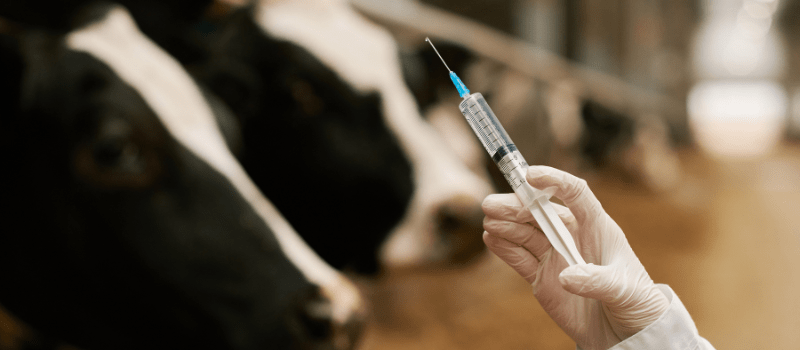Written by Tanja Kisslinger, Director of Communications, VWB. Special thanks to Dr. Andrea Ellis, DVM—Public Health and One Health Consultant, and VWB Board Member—for reviewing and providing expert insights for this article.
Recognizing World Immunization Week
World Immunization Week (April 24-30) is a time to recognize the power of vaccines in preventing disease and protecting health across species. Every year, preventable diseases take a serious toll on both people and animals—from rabies to livestock epidemics. Vaccination remains one of our most powerful tools for stopping outbreaks before they start. While immunization is often thought of in the context of human health, veterinarians play a crucial, yet often overlooked, role in global disease prevention. Their efforts in companion animal vaccination, livestock disease prevention, and zoonotic disease surveillance are essential to safeguarding both animal and human health.
In this blog, we highlight the critical contributions of veterinarians and Community Animal Health Workers (CAHWs) in delivering life-saving immunization programs that prevent devastating disease outbreaks and strengthen global health security.
Animal Vaccination: A Pillar of One Health
Immunization programs for animals contribute significantly to animal welfare, agricultural productivity, and human health. Without vaccination, infectious diseases can decimate livestock populations, leading to food insecurity and financial ruin for farmers. Even more critically, many animal diseases are zoonotic, meaning they can be transmitted to humans. Effective animal vaccination programs reduce the risk of disease spillover, stopping outbreaks at their source.
According to the World Organisation for Animal Health (WOAH), 60% of all infectious diseases in humans originate from animals (WOAH, 2024). This underscores the interconnectedness of human and animal health—a concept known as One Health. By prioritizing vaccination, veterinarians play a preventative role in global health security, ensuring healthier futures for both animals and people.
Figure: Why Animal Vaccination Matters Veterinarians at the Forefront: Preventing Rabies, Livestock Diseases, and Zoonotic Outbreaks
Veterinarians at the Forefront: Preventing Rabies, Livestock Diseases, and Zoonotic Outbreaks
Rabies Vaccination: Saving Lives Through Prevention
Rabies is a 100% fatal viral disease that affects the nervous system and is transmitted primarily through dog bites. While rabies is preventable with vaccination, it remains a significant public health threat, particularly in Africa and Asia, where access to post-exposure treatment is limited.
Veterinarians lead mass dog vaccination campaigns, which are the most cost-effective way to eliminate rabies. These campaigns require meticulous planning, community engagement, and logistical coordination to ensure widespread coverage. According to the World Health Organization (WHO), mass dog vaccination is the most effective strategy for preventing human rabies deaths (WHO, 2024).
By vaccinating at least 70% of a dog population, veterinarians break the cycle of transmission, dramatically reducing rabies cases in both animals and humans. Veterinarians Without Borders (VWB) and other global organizations work tirelessly to support these initiatives, bringing lifesaving vaccines to vulnerable communities. Over the past year (April 2024 to March 2025), VWB's Northern Animal Health Initiative (NAHI) delivered more than 620 rabies vaccinations in remote communities across Canada's North.
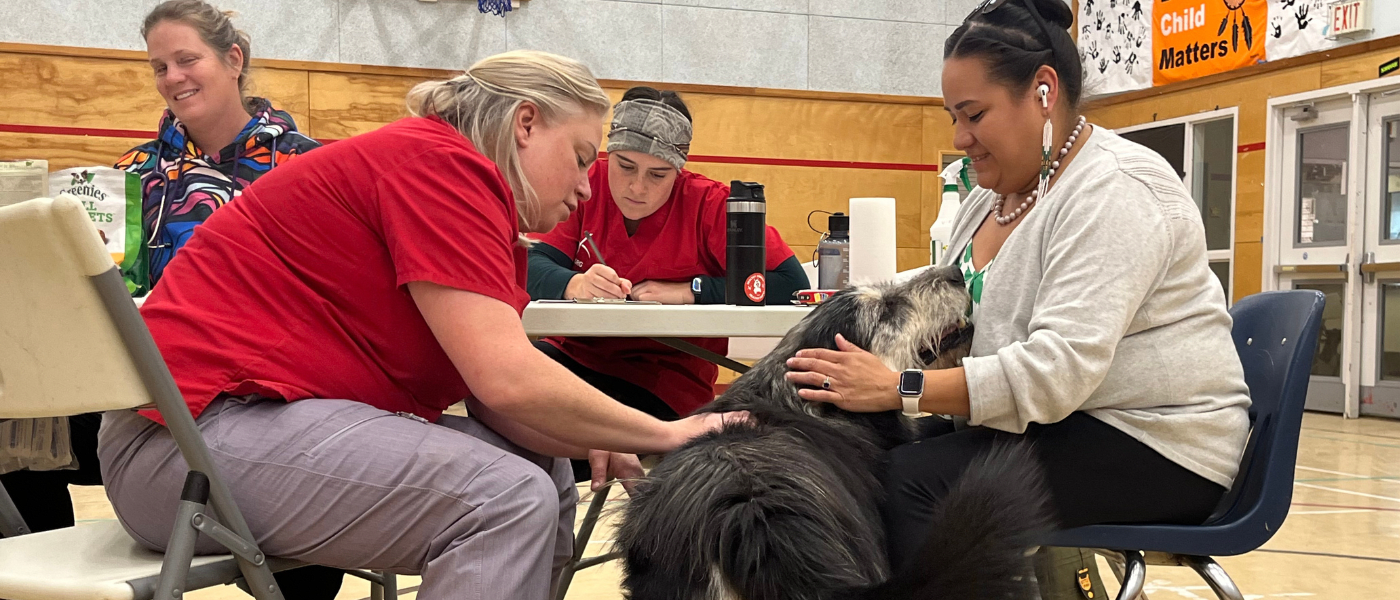 PHOTO: In September 2024, VWB’s NAHI team hosted a community clinic in Fort Liard, NWT—providing vaccinations, spay/neuter surgeries, and wellness care for local pets.
PHOTO: In September 2024, VWB’s NAHI team hosted a community clinic in Fort Liard, NWT—providing vaccinations, spay/neuter surgeries, and wellness care for local pets.
Livestock Vaccination: Protecting Farmers and Food Security
Livestock diseases like Foot and Mouth Disease (FMD), Peste des Petits Ruminants (PPR), and Brucellosis can devastate rural economies. For smallholder farmers, the loss of even a few animals can mean financial disaster.
Veterinarians prevent these outbreaks through regular livestock vaccination programs, which:
- Protect farmers’ incomes by reducing disease losses.
- Ensure food security by maintaining healthy livestock populations.
- Prevent trade restrictions that arise from disease outbreaks.
Veterinarians train farmers on proper vaccination schedules, disease recognition, and biosecurity measures, ensuring sustainable and long-term disease control. Their work is essential in reducing economic instability caused by preventable livestock diseases.
Zoonotic Disease Surveillance: Detecting the Next Outbreak Before It Starts
Because many infectious diseases originate in animals, veterinarians play a key role in early detection and response. Through clinical work, diagnostic testing, and epidemiological investigations, veterinarians identify potential outbreaks before they spread to humans.
Collaboration is critical—veterinarians work alongside public health officials, environmental scientists, and community health workers to track disease trends, report unusual cases, and implement control strategies. The One Health approach ensures that animal health data is exchanged with human health experts, creating a unified assessment and response to emerging threats.
Extending Veterinary Care: The Role of Community Animal Health Workers (CAHWs)
While veterinarians lead animal immunization efforts, reaching remote and underserved communities remains a challenge. This is where Community Animal Health Workers (CAHWs) play a vital role. CAHWs are local livestock keepers selected by their communities and trained in basic animal health care, including disease recognition, vaccination, and biosecurity practices. They serve as a crucial link between veterinarians and rural farmers, ensuring that even the most isolated regions have access to essential veterinary services.
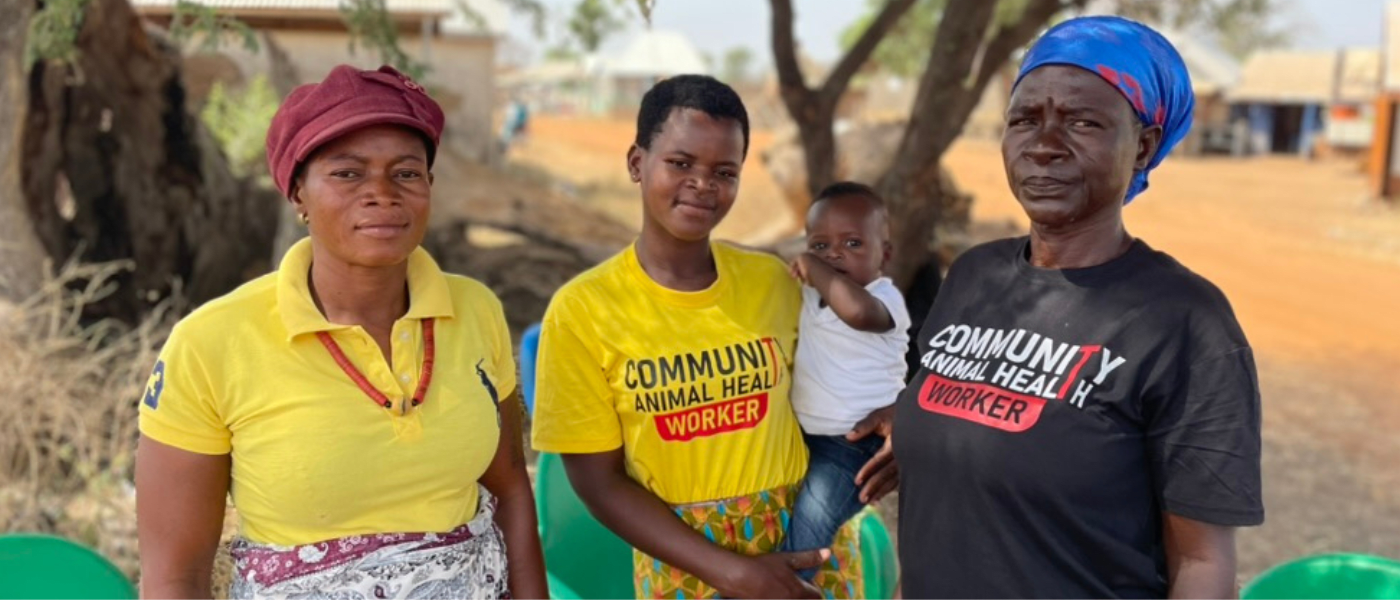 PHOTO: Three CAHWs in the Upper East Region of Ghana, trained through VWB's VETS program to improve livestock health and inspire gender equity in rural communities.
PHOTO: Three CAHWs in the Upper East Region of Ghana, trained through VWB's VETS program to improve livestock health and inspire gender equity in rural communities.
However, in many low- and middle-income countries, formal veterinary services are scarce, leaving livestock keepers with few options for medical care. Without trained professionals available, farmers often rely on over-the-counter medications, including antibiotics, without proper guidance. While these medications can be lifesaving, their misuse and overuse contribute to antimicrobial resistance (AMR)—a global crisis that threatens both animal and human health. Farmers frequently report that drugs they once used to treat common infections in their animals are becoming less effective, a clear sign of potential increasing drug resistance and the need for better support.
To combat this, VWB invests in CAHW training to ensure that livestock keepers in remote and underserved regions have access to trained professionals who can provide accurate diagnoses, appropriate treatment, and preventive care. Our programs emphasize:
- Proper use of veterinary drugs – CAHWs learn to administer medications correctly, ensuring that antibiotics are only used when truly necessary and at the right dosages.
- Disease prevention through vaccination – Where permitted by local regulations, CAHWs are trained to implement vaccination programs for livestock to prevent locally significant diseases, such as Newcastle disease.
- Animal husbandry and biosecurity practices – CAHWs educate livestock keepers on proper breeding, feeding, and disease management strategies to reduce the need for medications altogether.
Technology in Action: The FAO Mobile App for Disease Surveillance
Through our VETS program in Ghana, VWB trains CAHWs in using FAO’s Event Mobile Application (EMA-i+) for real-time disease surveillance and reporting. EMA-i+ is part of FAO’s Early Warning System package and enhances disease prevention by fostering increased awareness and data sharing on suspected outbreaks within local communities. The app enables CAHWs to:
- Record disease symptoms and GPS locations.
- Upload photos of affected animals for veterinarian review.
- Send real-time reports to national surveillance systems.
Since its launch in January, 2024, EMA-i+ has been implemented in 17 countries, including Ghana, Kenya, Uganda, Mozambique, Tanzania, and others. The system has grown to over 3,860 users, facilitating the reporting and secure storage of more than 35,545 disease events in FAO’s EMPRES-i system.
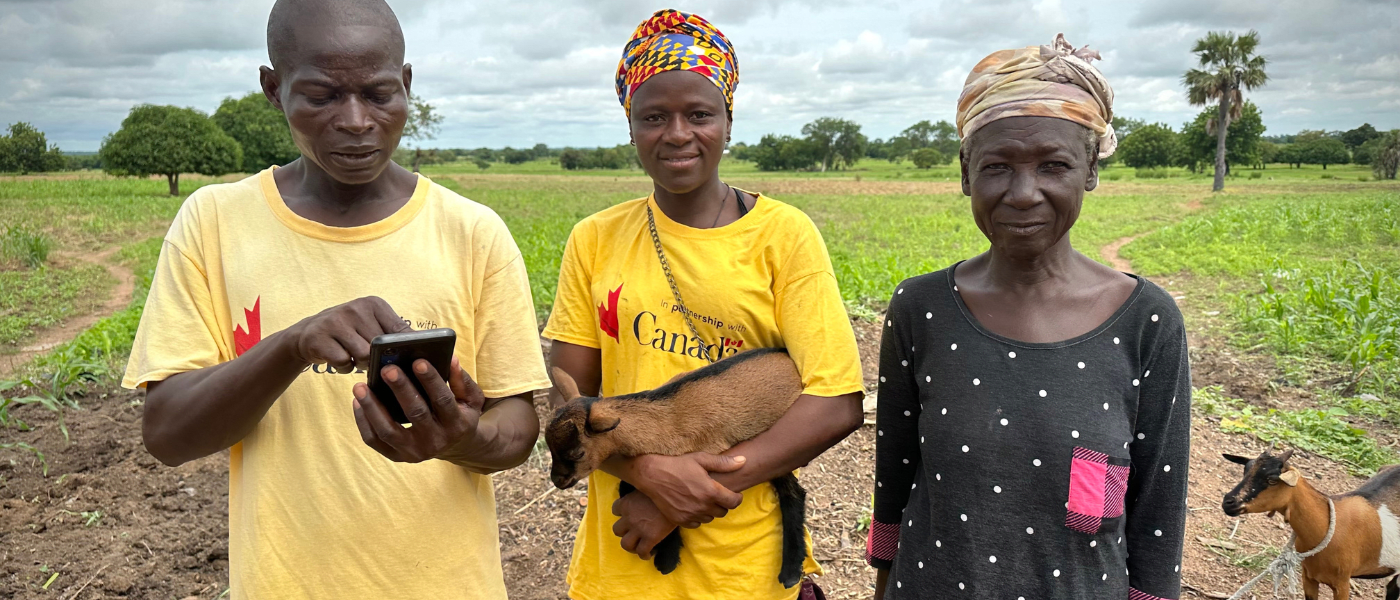 PHOTO: In Ghana, VETS-trained Community Animal Health Workers Clement Afuo (L) and Ida Achatowe (C) use the FAO mobile app to help a farmer (R) report her goat's symptoms.
PHOTO: In Ghana, VETS-trained Community Animal Health Workers Clement Afuo (L) and Ida Achatowe (C) use the FAO mobile app to help a farmer (R) report her goat's symptoms.
This rapid reporting enables veterinarians and health officials to detect outbreaks earlier, respond faster, and prevent larger epidemics. Additionally, the data collected through this system informs national and international disease prevention policies, reinforcing the One Health approach.
By equipping CAHWs with technology, we bridge the gap between rural communities and veterinary expertise, making animal health services more accessible, responsive, and data-driven.
Conclusion: Vaccination as a Cornerstone of Global Health
As we mark World Immunization Week, we recognize the critical role that veterinarians play in protecting health across species. Their work in vaccination programs, disease surveillance, and training CAHWs is essential for preventing outbreaks before they start.
Investing in veterinary medicine and community-based animal health programs strengthens global health security, protects livelihoods, and ensures a healthier future for both animals and people. Supporting organizations like VWB helps build stronger animal health systems and expands the reach of veterinary care worldwide.
During World Immunization Week, let’s celebrate the power of vaccines in building a world where people and animals can thrive—together.
References:
- World Organisation for Animal Health (WOAH). (2024). Animal Diseases.
- World Health Organization (WHO). (2024). Rabies.
- Food and Agriculture Organization of the United Nations (FAO). (15/01/2024). FAO launches enhanced EMA-i: empowering real-time animal disease reporting.
- Veterinarians Without Borders (VWB). (2023). Empowering Livestock Keepers: How and why VWB/VSF is combating Antimicrobial Resistance.
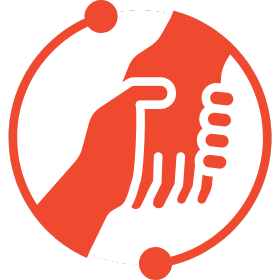 Join us in advancing animal immunization and disease prevention! From rabies control to livestock vaccination and CAHW training, VWB’s work is strengthening veterinary systems where they’re needed most. Donate, volunteer, or subscribe to support disease prevention, protect farmers’ livelihoods, and reinforce the vital connection between animal, human, and environmental health.
Join us in advancing animal immunization and disease prevention! From rabies control to livestock vaccination and CAHW training, VWB’s work is strengthening veterinary systems where they’re needed most. Donate, volunteer, or subscribe to support disease prevention, protect farmers’ livelihoods, and reinforce the vital connection between animal, human, and environmental health.

